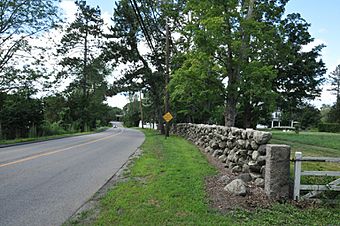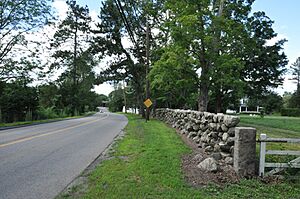Wellington Farm Historic District facts for kids
Quick facts for kids |
|
|
Wellington Farm Historic District
|
|
 |
|
| Location | 487-500 Wellesley St., Weston, Massachusetts |
|---|---|
| Area | 35 acres (14 ha) |
| Architect | Chandler, Joseph Everrett |
| Architectural style | Colonial Revival, Georgian, Federal |
| NRHP reference No. | 88000426 |
| Added to NRHP | April 14, 1988 |
The Wellington Farm Historic District is a special old farm property in Weston, Massachusetts. It covers about 35 acres (14 hectares). This district includes a main house built around 1760, plus barns from the 1800s and 1900s. There is also a modern greenhouse and farm fields with old stone walls.
This farm is important because its buildings are very well-preserved. It also shows how a working farm changed into a summer home over time. Today, it is one of the few farms still operating in Weston. The Wellington Farm Historic District was added to the National Register of Historic Places in 1988. This means it is recognized as a place important to history.
Exploring Wellington Farm: A Historic Place
The Wellington Farm is located on 35 acres (14 hectares) in a quiet, rural part of southern Weston. Wellesley Street cuts through the middle of the property. The farm is just south of the Massachusetts Turnpike and near Glen Road.
Open fields stretch along the road. There are two separate farm areas, one on each side of Wellesley Street. The eastern side has a farmhouse built around 1760. It was changed a bit around 1800 and again in 1900. The western side has a house from the early 1900s and newer buildings for farm work.
The Farm's Long History
Records show that part of this property existed as early as 1770. The house on the east side was already standing back then. By the early 1900s, the farm had grown much larger. It covered over 100 acres (40 hectares) and reached as far as Winter Street.
The Wellington Farm was used as a working farm until the late 1800s. After that, it became a summer estate. This means it was a large property used by a family for vacations. Arthur Wight Wellington bought the farm in 1907. He was the president of a company called U.S. Leather. The farm is still owned by the Wellington family today.
 | Emma Amos |
 | Edward Mitchell Bannister |
 | Larry D. Alexander |
 | Ernie Barnes |




